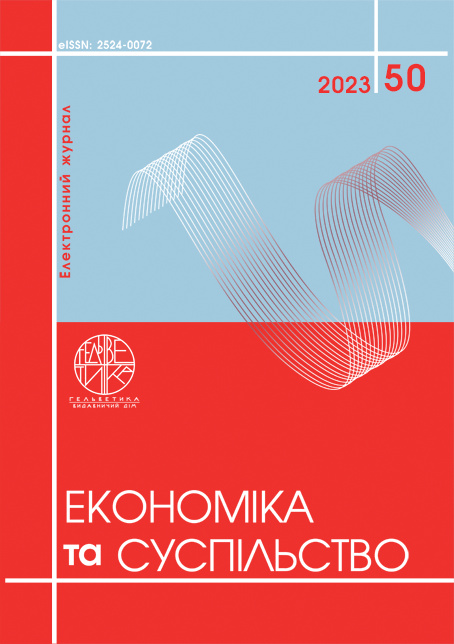ОСНОВНІ ЕТАПИ ФОРМУВАННЯ СТРАТЕГІЇ РЕЛОКАЦІЇ ПІДПРИЄМСТВА В УМОВАХ ВОЄННОГО СТАНУ
Анотація
В статті виокремлено основні фактори, що впливають на прийняття рішення щодо релокації підприємства в умовах воєнного стану, а саме безпека, доступність ресурсів, інфраструктура, робоча сила. Визначено, що планування релокації, яке передбачає планування фінансових витрат, логістики, перевезення обладнання та персоналу, є критичним етапом у формуванні стратегії підприємств в умовах воєнного стану. Планування релокації передбачає певні дії, які допоможуть забезпечити безпроблемне переміщення підприємства, а саме оцінка витрат, пов’язаних з релокацією; логістичне планування; перевезення обладнання та персоналу до нового місцезнаходження. В статті запропоновано ряд етапів щодо формування стратегії релокації підприємства в умовах воєнного стану, що передбачає послідовне проходження таких етапів: аналіз потенційні переваги та недоліки релокації; дослідження ринку; планування бюджету; юридичні та нормативні аспекти; управління робочою силою, адаптація персоналу; план комунікації; налаштування інфраструктури та планування робочого простору; планування транспортування та логістики; адаптація бізнес-модель і стратегії; оцінка релокації.
Посилання
Міністерство економіки України. Програма релокації підприємств. URL: https://me.gov.ua/Documents/Detail?lang=uk-UA&id=3e766cf9-f3ca-4121-8679-e4853640a99a&title=ProgramaRelokatsiiPidprimstv
Міністерство економіки України. За рік війни в більш безпечні регіони релоковано 800 підприємств. 2023. URL: https://www.me.gov.ua/News/Detail?lang=uk-UA&id=a700c206-722a-4752-b5bb-78a1063ae9db&title=ZaRikViiniVBilsh
Корчинський І.О., Щадило М.І. Стратегія реалізації безпекових механізмів підвищення рівня конкурентоспроможності підприємств. Проблеми сучасних трансформацій. Серія: економіка та управління. 2022. № 5. DOI: https://doi.org/10.54929/2786-5738-2022-5-04-02
Кундєєва Г., Мартинюк Л. Релокація як спосіб відновлення та підтримки бізнесу у період агресії. Конкурентоспроможність національної економіки: матеріали XX Міжнародної науково-практичної конференції. 2022. С. 106–108.
Омельчак Г. Особливості формування конкурентоспроможності підприємств в умовах воєнного стану. Економічний простір. 2023. № 184. С. 114–117. DOI: https://doi.org/10.32782/2224-6282/184-19
Щадило М. Основні загрози конкурентоспроможності промислового підприємства в умовах воєнного стану. Актуальні питання у сучасній науці, 2023. № 1 (7). С. 106–112. DOI: https://doi.org/10.52058/2786-6300-2023-1(7)-106-112
Ministerstvo ekonomiky Ukrainy. Prohrama relokatsii pidpryiemstv [Ministry of Economy of Ukraine. Enterprise relocation program]. Available at: https://me.gov.ua/Documents/Detail?lang=uk-UA&id=3e766cf9-f3ca-4121-8679-e4853640a99a&title=ProgramaRelokatsiiPidprimstv
Ministerstvo ekonomiky Ukrainy. Za rik viiny v bilsh bezpechni rehiony relokovano 800 pidpryiemstv [Ministry of Economy of Ukraine. During the year of the war, 800 enterprises were relocated to safer regions]. Available at: https://www.me.gov.ua/News/Detail?lang=uk-UA&id=a700c206-722a-4752-b5bb-78a1063ae9db&title=ZaRikViiniVBilsh
Korchynskyi I.O., & Shchadylo M.I. (2022) Stratehiia realizatsii bezpekovykh mekhanizmiv pidvyshchennia rivnia konkurentospromozhnosti pidpryiemstv [Strategy for implementing security mechanisms to increase the level of competitiveness of enterprises]. Problemy suchasnykh transformatsii. Seriia: ekonomika ta upravlinnia. – Problems of modern transformations. Series: Economics and Management. DOI: https://doi.org/10.54929/2786-5738-2022-5-04-02 [in Ukrainian]
Kundieieva H., Martyniuk L. (2022) Relokatsiia yak sposib vidnovlennia ta pidtrymky biznesu u period ahresii [Relocation as a way of restoring and supporting business during the period of aggression]. Konkurentospromozhnist natsionalnoi ekonomiky: materialy XX Mizhnarodnoi naukovo-praktychnoi konferentsi – Competitiveness of the national economy: materials of the XX International Scientific and Practical Conference. (Kyiv, October 20-21th, 2022) (Part 1, pp. 106–108) [in Ukrainian]
Omelchak H. (2023) Osoblyvosti formuvannia konkurentospromozhnosti pidpryiemstv v umovakh voiennoho stanu. [Peculiarities of the formation of the competitiveness of enterprises in the conditions of martial law] Ekonomichnyi prostir – Economic space, 184, 114–117. DOI: https://doi.org/10.32782/2224-6282/184-19 [in Ukrainian]
Shchadylo M. (2023) Osnovni zahrozy konkurentospromozhnosti promyslovoho pidpryiemstva v umovakh voiennoho stanu [The main threats to the competitiveness of an industrial enterprise in the conditions of martial law]. Aktualni pytannia u suchasnii nautsi – Current issues in modern science, 1(7), 106–112. DOI: https://doi.org/10.52058/2786-6300-2023-1(7)-106-112 [in Ukrainian]

Ця робота ліцензується відповідно до Creative Commons Attribution 4.0 International License.


